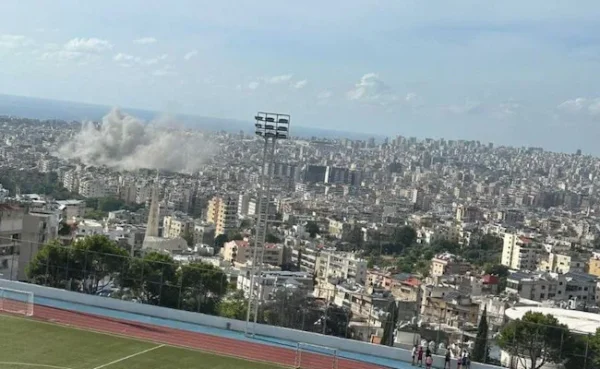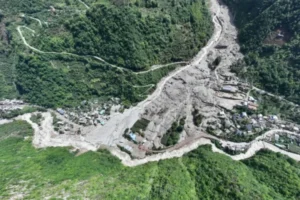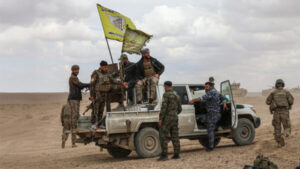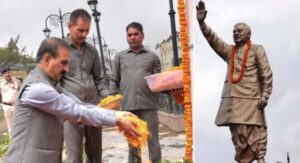
Hezbollah has not officially confirmed Ibrahim Aqil's death
Ibrahim Aqeel, wanted by the United States for his involvement in the 1983 bombing of the US embassy in Beirut, was the head of the Iran-backed militant group’s elite Radwan unit.
AFP journalists at the scene reported that the blast created a huge crater and destroyed the lower floors of a high-rise building in the southern suburbs of the Lebanese capital, a Hezbollah stronghold.
Aqeel’s killing is the second killing of a senior Hezbollah commander since the start of the war in Gaza. Earlier in July, Fuad Shukr was killed in another Israeli attack in Beirut.
The incident came after two waves of explosions on Tuesday and Wednesday that hit communications equipment used by Hezbollah members, which Hezbollah blamed on Israel, killing dozens and dealing a blow to Hezbollah while the focus of the Israel-Hamas war shifted dramatically north.
The Israeli military said Friday it carried out a “targeted attack” to kill Aqeel and which also killed about 10 other senior Radwan commanders.
The Lebanese Health Ministry said 12 people were killed and 66 others wounded in the attack.
Earlier, a source close to Hezbollah, requesting anonymity to discuss sensitive matters, said Aqeel was killed in the attack.
“The Israeli airstrike killed Radwan Force commander Ibrahim Aqeel, who was the second-in-command of its armed forces after Fuad Shukr,” the source close to Hezbollah said.
Hezbollah has not officially confirmed his death, but it said after the attack that it had targeted an Israeli intelligence base with rockets, which it blamed for unspecified “assassinations.”
The United States had offered a $7 million reward for information leading to the capture of Aqeel, describing him as a “key member” of the organization that bombed the embassy in 1983, killing 63 people.
Communications equipment explodes
Israeli forces and Hezbollah fighters have been fighting each other along the Israel-Lebanon border since Hamas launched an attack into Gaza on October 7.
For nearly a year, the focus of Israeli shelling has been on Gaza, but with Hamas greatly weakened, the focus of the war has shifted dramatically to Israel’s northern border.
Border clashes that occur almost every day have killed hundreds of people in Lebanon, most of them fighters, and dozens in Israel, and forced thousands of people on both sides to flee their homes.
On Tuesday and Wednesday, Hezbollah came under unprecedented attack, which it has blamed on Israel, although Israel has not yet commented.
The attacks blew up communications equipment belonging to thousands of Hezbollah activists over two days, killing 37 people and wounding thousands more.
Hezbollah chief Hassan Nasrallah vowed on Thursday that Israel would have revenge for the blasts.
Earlier on Friday, Israel said Hezbollah had fired dozens of rockets from Lebanon after air strikes destroyed dozens of the terrorist group’s launchers.
Speaking to troops on Wednesday, Israeli Defense Minister Yoav Galant said: “Hezbollah will have to pay an increasing price” as Israel tries to ensure the “safe return” of its citizens to the border areas.
“We are at the beginning of a new phase of the war,” he said.
Meanwhile, Israeli Prime Minister Benjamin Netanyahu postponed his scheduled departure for the United States by a day, where he is to address the United Nations General Assembly, an official said, citing the situation on the northern front.
Earlier on Friday, Hezbollah said it targeted at least six Israeli military targets with rockets after an overnight bombardment that southern Lebanese described as the worst they have ever seen.
‘Fear of wider war’
Residents of the Lebanese town of Marjayoun, close to the border, said the overnight bombardment was one of the heaviest since border clashes began last October.
“We were very scared, especially for our grandchildren,” said Nuha Abdo, 62. “We were moving them from one room to another.”
Clothing shop owner Eli Rameh, 45, counted more than 50 attacks.
“It was a horrific scene and unlike anything we have experienced since tensions escalated.
“We are living in fear of a wider war, you don’t know where to go.”
Call for restraint
International mediators are struggling to prevent the Gaza war from spiraling into a wider regional conflict.
US Secretary of State Antony Blinken, who has tried to salvage efforts for a Gaza ceasefire and hostage release deal, called on all sides to show restraint.
“We don’t want to see any aggressive actions by any side” that would threaten the goal of the Gaza ceasefire, he said.
The attacks by Hamas on October 7 that triggered the Gaza war resulted in 1,205 deaths on the Israeli side, most of them civilians, according to AFP figures. These figures are based on Israel’s official data, which includes hostages killed.
Of the 251 hostages held by the militants, 97 are still in Gaza, 33 of whom the Israeli military says are dead.
At least 41,272 people have been killed in Gaza in Israel’s retaliatory military offensive, most of them civilians, according to figures provided by the Hamas-run territory’s health ministry. The UN has deemed these figures reliable.

Continuing the achievement of the journey of effectiveness and credibility of more than 10 years in the career of journalism, as a woman journalist, I am Serving as the founder, promoter and editor of DiaryTimes with the trust and support of all. My credible coverage may not have given a big shape to the numbers, but my journey presents articles that make you aware of the exact and meaningful situations of Himachal’s politics, ground issues related to the public, business, tourism and the difficult geographical conditions of the state and financial awareness. DiaryTimes, full of the experience of my precise editorial expertise, is awakening the flame of credible journalism among all of you, so that the eternal flame of meaningful change can be lit in the life of the people of the state and the atrocities being committed against the people can be brought to the fore, I am motivated for that. If even a small change comes with the power of my journalism and the whole world becomes a witness to that issues, then I will consider myself fortunate.








